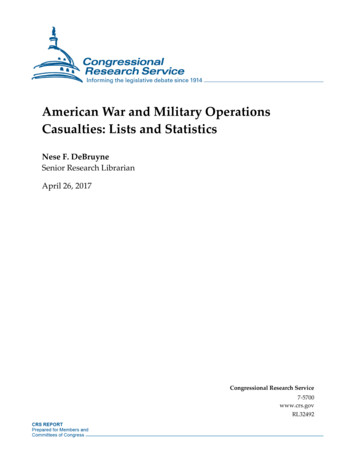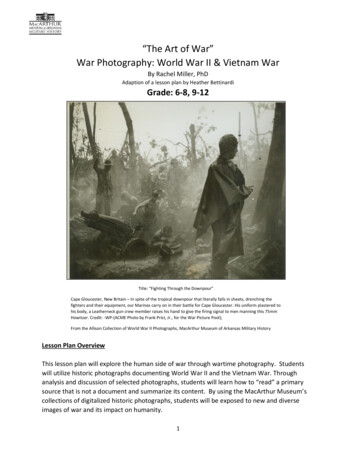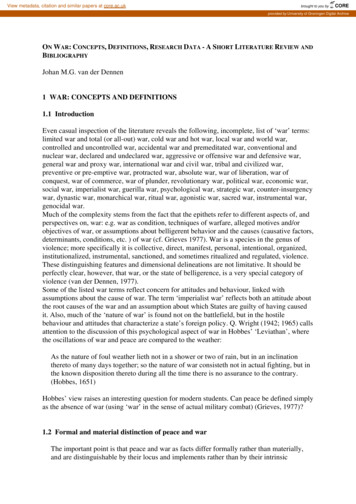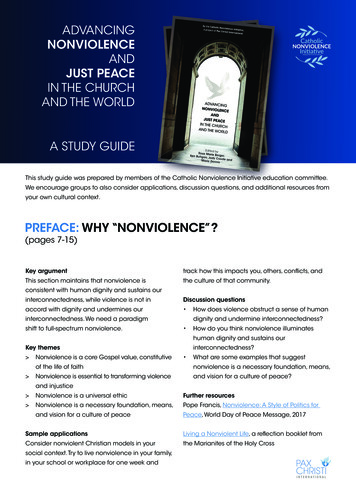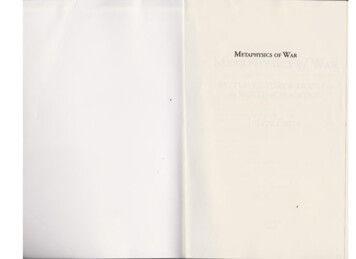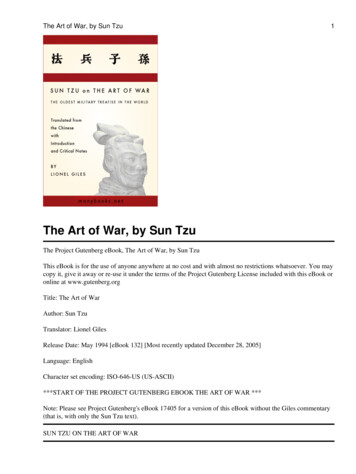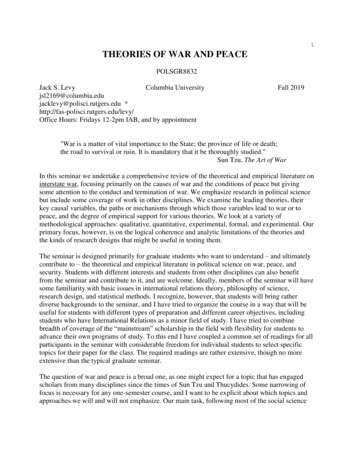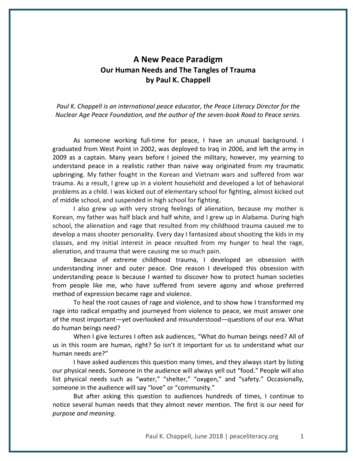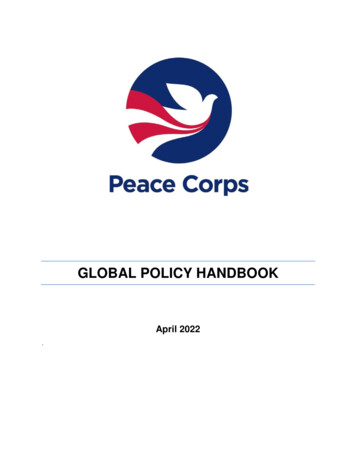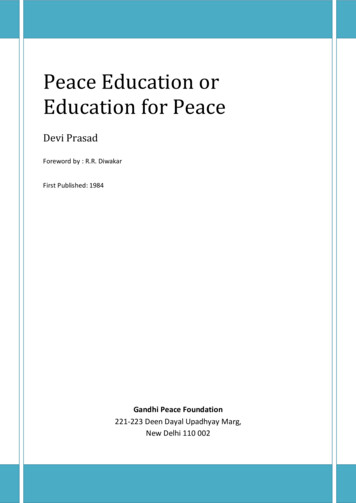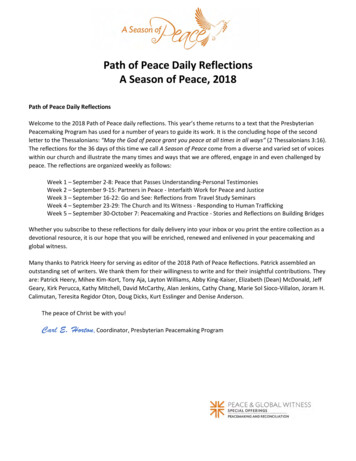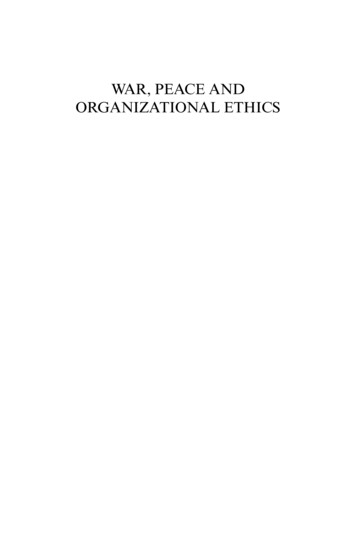
Transcription
WAR, PEACE ANDORGANIZATIONAL ETHICS
RESEARCH IN ETHICAL ISSUESIN ORGANIZATIONSSeries Editors: Michael Schwartz and Howard HarrisRecent Volumes:Volume 7: Insurance Ethics for a More Ethical World – Guest Edited by PatrickFlanagan, Patrick Primeaux and William Ferguson – 2007Volume 8: Applied Ethics: Remembering Patrick Primeaux – Edited by MichaelSchwartz and Howard Harris – 2012Volume 9: Ethics, Values and Civil Society – Edited by Michael Schwartz,Howard Harris and Stephen Cohen – 2013Volume 10: Moral Saints and Moral Exemplars – Edited by Michael Schwartzand Howard Harris – 2013Volume 11: The Contribution of Fiction to Organizational Ethics – Edited byMichael Schwartz and Howard Harris – 2013Volume 12: Achieving Ethical Excellence – Edited by Michael Schwartz andHoward Harris with Guest Editor Alan Tapper – 2014Volume 13: Conscience, Leadership and the Problem of ‘Dirty Hands’ – Editedby Matthew Beard and Sandra Lynch – 2015Volume 14: The Ethical Contribution of Organizations to Society – Edited byMichael Schwartz, Howard Harris and Debra Comer – 2015Volume 15: Contemporary Issues in Applied and Professional Ethics – Edited byMarco Grix and Tim Dare – 2016Volume 16: The Contribution of Love, and Hate, to Organizational Ethics –Edited by Michael Schwartz, Howard Harris and Debra R. Comer– 2016Volume 17: Responsible Leadership and Ethical Decision-Making – Edited bySunil Savur and Sukhbir Sandhu – 2017Volume 18: Ethics in the Global South – Edited by Michael Schwartz and HowardHarris – 2017Volume 19: Visual Ethics – Edited by Michael Schwartz and Howard Harris –2018Volume 20: Applied Ethics in the Fractured State – Edited by Bligh Grant, JosephDrew and Helen E. ChristensenVolume 21: The Next Phase of Business Ethics: Celebrating 20 Years of REIO –Edited by Michael Schwartz, Howard Harris and Debra R. ComerVolume 22: Ethics in a Crowded World: Globalisation, Human Movement andProfessional Ethics – Edited by Vandra Harris
RESEARCH IN ETHICAL ISSUES INORGANIZATIONS VOLUME 23WAR, PEACE ANDORGANIZATIONAL ETHICSEDITED BYMICHAEL SCHWARTZRoyal Melbourne Institute of Technology, AustraliaHOWARD HARRISUniversity of South Australia, AustraliaUnited Kingdom – North America – JapanIndia – Malaysia – China
Emerald Publishing LimitedHoward House, Wagon Lane, Bingley BD16 1WA, UKFirst edition 2020Copyright 2020 Emerald Publishing LimitedReprints and permissions serviceContact: permissions@emeraldinsight.comNo part of this book may be reproduced, stored in a retrieval system, transmitted inany form or by any means electronic, mechanical, photocopying, recording or otherwisewithout either the prior written permission of the publisher or a licence permittingrestricted copying issued in the UK by The Copyright Licensing Agency and in the USAby The Copyright Clearance Center. Any opinions expressed in the chapters are thoseof the authors. Whilst Emerald makes every effort to ensure the quality and accuracy ofits content, Emerald makes no representation implied or otherwise, as to the chapters’suitability and application and disclaims any warranties, express or implied, to their use.British Library Cataloguing in Publication DataA catalogue record for this book is available from the British LibraryISBN: 978-1-83982-777-8 (Print)ISBN: 978-1-83982-776-1 (Online)ISBN: 978-1-83982-778-5 (Epub)ISSN: 1529-2096 (Series)
CONTENTSEditorial Advisory Board viiAbout the Authors ixList of Contributors xiiiThe Ethics of War and PeaceMichael Schwartz and Howard Harris 1Chapter 1 Levinas and Business Ethics in the ‘War on Terror’Peter McGhee 5Chapter 2 The Ten Commandments of Working Robots inOrganisations: From History to the Future of Robot Ethics,Legislation, and ManagementIssam Kouatli, Rayan Kouatly and Abir Zaarour 27Chapter 3 Closing the Gap Between Promises and Outcomes:How Moral Frameworks Contribute to the Realisation of UnitedNations Deployment ObjectivesCharuka Ekanayake 49Chapter 4 Visualising Success: The Wisdom of John WoodenJim Wishloff 73Chapter 5 Rushing Fools and Wise Women: Tales forOrganisations Aiming to Improve LivesCécile Rozuel 101Chapter 6 Strong Identification, Weak Ideology, OrganisationalCulture or All: Unethical Pro-organisational Behaviour in IndiaPratima Verma and Siddharth Mohapatra 123Chapter 7 Forsaking the Mean for the Extreme:A Response to ProvisMichael Schwartz and Debra R. Comer v151
This page intentionally left blank
EDITORIAL ADVISORY BOARDRowena BarrettQueensland University of Technology,AustraliaSandra LynchUniv of Notre Dame Australia, AustraliaKimball P. MarshallAlcom State University, USAIda BergerHarvard Business School, USAE. Sharon MasonBrock University, CanadaNorman BowieUniversity of Minnesota, USADouglas McCabeGeorgetown University, USAHugh BreakeyGriffith University, AustraliaM. Neil BrowneBowling Green State University, USAAlex MichalosUniversity of Northern BritishColumbia, CanadaGeorges EnderleUniversity of Notre Dame, USABarry MitnickUniversity of Pittsburgh, USAEdwin EpsteinUniv of California at Berkeley, USAMoses PavaYeshiva University, USAAmitai EtzioniGeorge Washington University, USAMark S. SchwartzYork University, CanadaAl GiniLoyola University Chicago, USALucy TatmanUniversity of Tasmania, AustraliaKenneth E. GoodpasterUniversity of St Thomas, USASteven WartickUniversity of Northern Iowa, USALaura Pincus HartmanBoston University, USAJames S. WishloffUniversity of Lethbridge, CanadaDaryl KoehnDePaul University, USAvii
This page intentionally left blank
ABOUT THE AUTHORSDebra R. Comer is the Mel Weitz Distinguished Professor in Business andProfessor of Management and Entrepreneurship in the Zarb School of Businessat Hofstra University. She received her BA with honors in psychology fromSwarthmore College and her MA, MPhil, and PhD in organisational behaviourfrom Yale University. Her current research interests include ethical behaviour inorganisations and management education. She is the Book/Film Review Editorof Research in Ethical Issues in Organizations.Charuka Ekanayake is an Adjunct Member of the Law Futures Centre, GriffithUniversity, and an Affiliated Researcher at the Institute for Ethics, Governanceand Law of the same University. His research broadly focusses on the regulation of armed force in international law. He holds a Bachelor of Laws from theUniversity of London, Masters of Law from the University of Colombo and theUnited Nations Inter-Regional Crime and Justice Research Institute, Italy anda Doctor of Laws from Griffith University, Australia. He is enrolled as a practitioner in Sri Lanka and New South Wales, Australia.Howard Harris teaches business and professional ethics. A chartered engineer, heworked in industry before returning to university to obtain a PhD in ethics. Histhesis was on the role of courage in management decision making and he has anongoing interest in the relevance of traditional virtues in contemporary management. He is a past president of the Australian Association for Professional andApplied Ethics and a joint editor of Research in Ethical Issues in Organizations.Issam Kouatli, PhD, is currently employed by Lebanese American Universityin the field of Information Technology and Operations management (ITOM).He was granted PhD degree (1990) in the Engineering School in BirminghamUniversity (UK). His main research interest includes intelligent systems ingeneral and Fuzzy systems in specific. Inter-related Technology and IT-ethicalmanagement, performance and security of Cloud Computing concept became arecent research interest as well. He can be contacted at: Issam.kouatli@lau.edu.lbRayan Kouatly is a Managing Partner in ‘Kouatly & Associates’, has 29 years of experience in Corporate Law, International Commercial Arbitration, Oil and Gas, andNew Technologies laws with ethical complications. He was an Advisor for LebaneseParliamentarian Committee for energy (2011–2012), and has been a Board Memberof the Qatar Council of Health Practitioners. He is currently the Secretary Generalof the Lebanese Arbitration Center. He also acted as a Lecturer on InternationalCommercial Arbitration and a speaker at several international and national symposiums on Oil and Gas, PPP, Franchise, and other different Legal Topics.ix
xABOUT THE AUTHORSPeter McGhee is a Senior Lecturer in Business Ethics and Sustainability atAuckland University of Technology (AUT). His research interests include religion/spirituality at work, business ethics, virtue ethics and sustainability education.He has undertaken research on spirituality and ethical decision-making, ethicalleadership and corporate governance. His work has been published in the Journalof Business Ethics, Business Ethics: A European Review, Business and ProfessionalEthics Journal, Social Responsibility Journal and the Journal of Management,Spirituality and Religion. In addition to this, he has published several chaptersin various handbooks and encyclopaedias in the areas of spirituality/religion atwork and business ethics.Siddharth Mohapatra has a PhD in business and management from the Ca’FoscariUniversity, Venice, Italy. He has more than 17 years of experience in the for-profit,non-profit and educational sectors. He is currently serving as a Director in MiraSid(Pty) Ltd. His profession encompasses sustainable supply chain management, corporate social responsibility, managing the millennial workforce and professionalethics. He can be reached at: directormirasid@gmail.comCécile Rozuel is an Assistant Professor in Transformative Leadership andSpirituality at Saint Paul University, Ottawa, ON, Canada. Her research seeksto understand how individuals and communities can foster well-being in creative and inclusive ways. Drawing from C. G. Jung’s Analytical Psychology, sheexplores the conscious and unconscious dynamics of the psyche of individualsand organisations to make sense of archetypal patterns and developmental possibilities. Her work has focussed on ethics and the self, the meaningfulness ofalchemy, workplace well-being, as well as the moral and psychological value ofimagination and storytelling.Michael Schwartz is an Associate Professor of business ethics in the Schoolof Economics, Finance & Marketing at the Royal Melbourne Institute ofTechnology. He is a past president of the Australian Association for Professionaland Applied Ethics. He is a Member of the editorial boards of the Ramon LlullJournal of Applied Ethics and the Journal of International Business & Law; and ajoint editor of Research in Ethical Issues in Organizations.Pratima Verma (Alliance University, Bangalore) is an ex-research fellow from theStockholm University School of Business, Sweden. She has nearly 20 years ofexperience in the educational and consulting sectors. She is currently serving as aProfessor in Alliance University, Bangalore. She teaches and undertakes researchin the fields of human resource management, industrial psychology, business ethics, sustainability and value-based leadership. She can be reached at: pratima.verma@alliance.edu.in & verma pratima@yahoo.comJim Wishloff is an Associate Professor and an award winning teacher at theUniversity of Lethbridge in Calgary, Alberta, Canada. He has a BSc (Engineering)and an MBA from the University of Alberta and a PhD from Case Western Reserve
About the AuthorsxiUniversity. His publications include articles in the Journal of Business Ethics, theJournal of Religion and Business Ethics, the Journal of Business Ethics Education,Teaching Business Ethics, the Review of Business, the Journal of Markets & Morality,Solidarity: The Journal of Catholic Social Thought and Secular Ethics and the SocialJustice Review.Abir Zaarour is a legal Attorney employed by ‘Kouatly & Associates’ - An honorgraduate of Bachelor of Laws from Lebanese University, handling day-by-dayoperations in corporate legal aspects in different sectors of criminal and civilcases and experienced in Labor Law, Real-Estate Law, Telecommunication Law,Advanced Technology laws, AI and Robotics inter-related laws and ethics. Mainresearch interests are in the field of e-commerce and e-signature laws.
This page intentionally left blank
LIST OF CONTRIBUTORSDebra R. Comer Zarb School of Business, USACharuka Ekanayake Griffith University, AustraliaHoward Harris University of South Australia, AustraliaIssam Kouatli Lebanese American University (LAU), LebanonRayan Kouatly Kouatly & Associates Attorneys, LebanonPeter McGhee Auckland University of Technology, New ZealandSiddharth Mohapatra MiraSid Pyt Ltd, South AfricaCécile Rozuel Saint Paul University, CanadaMichael Schwartz School of Economics, Finance & Marketing, RoyalMelbourne Institute of Technology, AustraliaPratima Verma Alliance University, IndiaJim Wishloff The University of Lethbridge, CanadaAbir Zaarour Kouatly & Associates Attorneys, Lebanonxiii
This page intentionally left blank
THE ETHICS OF WAR AND PEACEMichael Schwartz and Howard HarrisLeo Tolstoy insisted that his masterpiece, War and Peace (1867/2004), was not anovel. Neither, Tolstoy claimed, was it a historical chronicle. But it has a plot andinvolves organisations at many levels – whether it is family, ballroom, militaryor government – and at each level we encounter ethical dilemmas. Undoubtedly,humanity strives for peace. However, there is much to support Winston Churchill’s(1947) claim that ‘the story of the human race is War’ (p. 184); especially aswarfare has never been restricted to armed conflict between nations. Currentlynations, political groups, companies and other organisations are engaged in‘wars’ of greater or lesser impact. One could say that wars run amok. The word‘war’ is used in many ways, and we refer to ‘war’ here without in any way suggesting that all meanings are the same. For simplicity, we have used the word warwithout quote marks even though not all agree that some of the circumstancesare properly to be called a war.China and America are involved in a burgeoning trade war which many fearheralds the end of globalisation. America wages a war on drugs and a war on terror. In Kenya, there is a war against the ivory poachers. Green Peace is challenging whalers. YouTube and Spotify have disrupted the Music Industry. Historiansare at loggerheads over interpreting the past in the history wars. Pepsi and Cokeseem to have been at war forever. Traditional bookstores are at war with onlineretailers. Environmentalists are at war with coal miners. Animal rights activists are at war with companies testing their products on animals. Hermés, LouisVuitton, Ralph Lauren and other such luxury good manufacturers are at warwith counterfeiters. All such conflict has ethical implications.Peter Drucker (1979) discussed the rise of organisations. Today, they are ubiquitous. Some are for-profit organisations, others are not-for-profit organisations.Ethical issues emerge for organisations when they engage in strategic conflict, goto war, or fight back against predators. In this issue of Research in Ethical Issuesin Organizations, we hoped to explore the reality of such situations. And so weissued a call for papers which asked contributors to explore the ethics of war and –if you so like – of peace and the implications of either for organisational ethics.War, Peace and Organizational EthicsResearch in Ethical Issues in Organizations, Volume 23, 1–3Copyright 2020 by Emerald Publishing LimitedAll rights of reproduction in any form reservedISSN: 1529-2096/doi:10.1108/S1529-2096202000000230011
2MICHAEL SCHWARTZ AND HOWARD HARRISThis issue is organised as follows. In Chapter 1, ‘Levinas and Business Ethics inthe “War on Terror”’, Peter McGhee applies the philosophy of Emmanuel Levinasto the role played by business in the ‘War on Terror’. McGhee uses Levinasianethics to explain how organisations, often with many ethical resources, are associated with military drones strikes against civilians, and his chapter offers ideas thatchallenge this practice.Military drones use advanced technology. Drones are robots and the technology used by such robots both in warfare and in peaceful employment is evolving.Chapter 2 ‘The Ten Commandments of Working Robots in Organisations: FromHistory to the Future of Robot Ethics, Legislation, and Management’ by IssamKouatli, Rayan Kouatly and Abir Zaarour explores a new generation of robotswhich can make decisions without human intervention; and discusses what theauthors term ‘robot ethics’.In Chapter 3, ‘Closing the Gap Between Promises and Outcomes: HowMoral Frameworks Can Guide the Realisation of United Nations DeploymentObjectives’, Charuka Ekanayake explains that United Nations missions oftenrequire troops to employ force, whether it is to safeguard a mission and the humanitarian personnel, or to protect civilians, or to neutralise violent armed groups, orin pure self-defence. But that the use of force – and equally not using force – canreadily frustrate the very objectives these troops are deployed to uphold, in turncreating gaps between the Promises they make and the Outcomes they actuallysecure. Charuka Ekanayake’s paper tries to find answers to this dilemma froma moral perspective and considers how the peculiar nature of the morality ofresorting to force by the United Nations influences its use of force.Indisputably both the ethical employment of robots and the utilisation ofmoral frameworks, requires moral leadership. In Chapter 4, ‘Visualizing Success:The Wisdom of John Wooden’, Jim Wishloff writes that Alasdair MacIntyreurged that we learn from the accounts of exemplary lives. In his paper JimWishloff provides us with an examination of John Wooden’s conception of leadership which bridges virtue theory and leadership.Both the following two chapters are related to Jim Wishloff’s chapter. AlasdairMacIntyre insisted that we need to know which story we are a part of. CécileRozuel in Chapter 5, ‘Rushing Fools and Wise Women: Tales for OrganisationsAiming to Improve Lives’, introduces and discusses two tales. Cécile Rozuel usesthese tales to highlight how lessons can be drawn from tales with practical implications for organisational life and, furthermore, for the implementation of meaningful change in relation to well-being in and outside of work.In Chapter 6, ‘Strong Identification, Weak Ideology, Organisational Cultureor All: Unethical Pro-organisational Behaviour in India’, Pratima Verma andSiddharth Mohapatra introduce research which presents a comprehensive explanation of unethical pro-organisational behaviour. Pratima Verma and SiddharthMohapatra reveal in their study that strong ethical organisational culture maynot restrain, but instead facilitate unethical pro-organisational behaviour. This isa view at odds with Wooden’s conceptions of a leadership which bridges virtuetheory and leadership.
3The Ethics of War and PeaceLastly, Chapter 7 in this issue is a response paper. In an earlier chapter in thisjournal Chris Provis discussed Aristotle’s Doctrine of the Mean and its counterpart in Confucianism. In their response chapter, ‘Forsaking the Mean for theExtreme: A Response to Provis’, Michael Schwartz and Debra R. Comer arguethat whilst some scholars advocate Aristotle’s Mean others advocate forsakingthat Mean and pursuing the extreme.All of the chapters in the issue have been peer-reviewed. The editors are mostgrateful to the contributors and as always to the reviewers who must remainnameless.REFERENCESChurchill, W. S. (1947). Thoughts and adventures. London: Odhams.Drucker, P. F. (1979). The practice of management. London: Pan Books.Tolstoy, L. (2004). War and peace (Trans. C. Garnett). New York, NY: Penguin Random House.
This page intentionally left blank
CHAPTER 1LEVINAS AND BUSINESS ETHICSIN THE ‘WAR ON TERROR’Peter McGheeABSTRACTThis Chapter applies the philosophy of Emmanuel Levinas to business’ rolein the ‘War on Terror’. Specifically, it uses Levinasian ethics to explain howorganisations, often with an abundance of ethical resources, become associatedwith military drones strikes against civilians, and offers ideas that challengethis practice. The chapter comprises several sections beginning with a briefintroduction to the ‘War on Terror’ and the use of military drones. A concisediscussion about business ethics and just war theory follows after which, thechapter explains Levinas’ ethics and his views on war. These ideas are appliedto transform business ethical practice in this controversial area. The Chapterconcludes with a summary of its main points.Keywords: War on Terror; Military Drone Strikes; Just War; EmmanuelLevinas; Ethics; Alterity; Business1. INTRODUCTIONIn 2018, several thousand Google employees signed and published an openletter to their CEO urging the company not to work on a Pentagon ‘ArtificialIntelligence Engine’ (Project Maven) that analyses video for drone strikes. Theletter began:War, Peace and Organizational EthicsResearch in Ethical Issues in Organizations, Volume 23, 5–25Copyright 2020 by Emerald Publishing LimitedAll rights of reproduction in any form reservedISSN: 1529-2096/doi:10.1108/S1529-2096202000000230025
6PETER McGHEEWe believe that Google should not be in the business of war. Therefore we ask that ProjectMaven be cancelled, and that Google draft, publicize and enforce a clear policy stating thatneither Google nor its contractors will even build warfare technology.Google’s management described the work as ‘non-offensive’. The Pentagon,they stated, was using “open-source object recognition software available to anyGoogle Cloud customer and the technology is used to flag images for humanreview” (Shane & Wakabayashi, 2018). However, Chappellet-Lanier (2018), quoting Lt. Col. Garry Floyd, the deputy chief of Project Maven, noted it is “an artificial intelligence and machine learning project that aims to help Air Force analystsmake better use of full-motion video surveillance” and that it has “already beendeployed to five or six combat locations”. Interestingly, Google cancelled the contract at the beginning of 2019 to head off an employee rebellion (Harwell, 2018).Imagine you lived where there is a supposed terrorist threat, that you werean unwilling part of the ‘War on Terror’.1 Day and night, you hear the constantbuzzing overhead. You know that a machine is watching you; taking note of everything, you do. Your government promises the machine only targets ‘bad people’, but its missiles have come into your village, and sometimes they kill yourfamily, friends, and neighbours. You wonder how many people have died in yourarea. According to Republican Senator Lindsay Graham, “We’ve killed 4,700.Sometimes you hit innocent people, and I hate that, but we’re at war, and we’vetaken out some very senior members of Al-Qaeda” (Terkel, 2013). More recentanalysis puts the death toll at between 8,459 – 12,105 people (Fielding-Smith &Purkiss, 2018).While there is clear evidence that drone strikes kill civilians (Fielding-Smith &Purkiss, 2018; Howie & Hutchinson, 2012; Shah et al., 2012; Woods, 2015), countries either deny this, or use euphemisms for such unknown targets as “enemieskilled in action” (Scahill, 2016, p. 18) or “military-aged males” (Byrne, 2018,p. 84). This is not surprising given the surveillance and intelligence limitations ofdrones. Analysts are often thousands of miles away, and do not have access to thelocal knowledge that ground troops have. Difficulties like the ‘soda straw’ effect(Howie & Hutchinson, 2012) means drone pilots cannot see the bigger pictureas they zoom in on their targets. Consequently, they often fail to perceive neutrals entering the drone strike area at the last moment. Drone operators, Howieand Hutchinson claim, also can experience "data crush", which is the inability toevaluate accurately the large amounts of video data they receive leading to inaccurate targeting. If these were not enough to raise concerns, drone strikes oftenrely on phone intercepts. However, by switching sim cards, one can produce aneffective decoy.Apart from the emotional cost of losing love ones; in the countries targetedby drones, “Families are often large, and their wellbeing is intricately connectedamong many members. The death of one member can create long-lasting instability,particularly if a breadwinner is killed” (Serwer, 2012, p. 2). Even if no one dies,the property damage can also have lasting negative outcomes. As Serwer notes,“a house is often a family’s greatest financial asset[.]Homes are often sharedby multiple families, compounding the suffering and hardship caused when a
Levinas and Business Ethics in the ‘War on Terror’7house is destroyed” (p. 2). In addition to the physical consequences, there are thepsychological effects of living under constant surveillance, never knowing whendeath might come from the sky. A report by the Centre for Civilians in Conflict(Shah et al., 2012) noted “that where drones often buzz overhead 24 hours a day,people live in constant fear of being hit” (p. 24). The endless noise produces emotional trauma and symptoms of anxiety, which often manifest physically in theform of headaches, heart problems, and even suicidal tendencies. This behaviour,states Owen (2013), “Is symptomatic of anticipatory anxiety - a mental phenomenon that causes people to worry constantly about their immediate future, and isvery common in conflict zones”.Arguably these adverse consequences produce more enemies, the contraryobjective of any military strategy (Jaeger & Siddique, 2018). As mental healthprofessionals note, "People who have experienced such things, they don’t trustpeople; they have anger, a desire for revenge So when you have these youngboys and girls growing up with these impressions, it causes permanent scarringand damage" (Owen, 2013). A recent report by the United Nations DevelopmentProgramme (2017) on African extremism supports this claim. It found that over70% of ‘extremists’ in Africa stated that the arrest or killing by security forcesof a family member or close friend motivated their choice to become part ofa terrorist group. In other words, the ‘War on Terror’ is encouraging people toperpetuate the very terror it is trying to eliminate. As an illustration of this,after alleged American involvement in a Pakistani Military Drone strike in2006 that killed 83 religious students, there was a suicide revenge bombingin Dargai that killed over 40 Pakistani soldiers and injured 20 others (Gall &Masoodnov, 2006).Of course, there are arguments in support of drone strikes. For instance,Bradley Strawser (2012), a leading advocate, argues:The best empirical evidence suggests that drones are more precise, result in fewer unintendeddeaths of civilian bystanders, and better protect their operators from risk than other weapons,such as manned aircraft, carrying out similar missions. Other things being equal, then, dronesshould be used in place of other less accurate and riskier weapons. But they should be used onlyfor morally justified missions, in pursuit of a just cause.Indeed, when we judge military drones by the number of sorties and kills inpursuit of terrorists, a supposedly just cause, it is easy to argue this is a normalform of warfare, and that these people are targets, even if the drones were unavailable. However, as Byrne (2018) argues such thinking misses a key feature ofthese strikes, something that makes them different from other forms of weaponry:drone use distorts the line between terrorists and civilians. In a traditional war,civilians are collateral damage. In this modern ‘War on Terror’, this differenceceases to exist (Schwarz, 2016) since anyone in the target area is a potential militant or terrorist, especially if selection is via ‘signature’ whereby “individuals aretargeted when their identities are unknown, but whose behaviour suggests thatthey are legitimate targets” (p. 69). To put this in real terms, of the number ofdrone kills reported by Fielding-Smith & Purkiss since 2004, approximately 769 –1,725 were civilians, and of these 253 – 397 were children. Other analysts estimate
8PETER McGHEEthe civilian casualty rate to be as high as 25% (Asaro, 2012; Woods & Yusufzai,2013). This is particularly disturbing given these civilian deaths occurred in countries with whom the United States and its allies are not legally ‘at war’.Eduardo Galeano (2013), the pre-eminent Uruguayan novelist once wrote, “Inthe Age of the Almighty Computer, drones are the perfect warriors. They killwithout remorse, obey without kidding around, and they never reveal the namesof their masters” (p. 311). Encountering this quote, reading the letter by Google’semployees, and contemplating the impact of military drone strikes on civilians,led the author to examine the role and moral responsibility of business in this‘War on Terror’ using the philosophy of Emmanuel Levinas. The next section setsthe scene for this analysis by first providing a brief discussion about the businessethics of war.2. THE BUSINESS ETHICS OF WARHistorically, the political state was responsible for fighting a war, while accountability for waging a war fell on the state’s armed forces (Alzola, 2011). Leftunchallenged, these assumptions tended to exonerate business of all responsibility. As Byrne remarks (2007), businesses “are well aware of this normativeagenda, but they see themselves as being outside its purview” (p. 202). Byrneclaims that the authority of the nation state in this area makes it near impossibleto “get a hearing for any claim that any business devoted to ‘national defense’could possibly be involved in fundamentally (not just incidentally) unethicalactivity” (p. 202).In recent times, several authors have challenged this view. For instance, Byrne(2010) writing from a consequentialist perspective, argued that a firm might beunethical if its actions were unjustifiably damaging either (a) always or (b) circumstantially. When applied to Google for example
spirituality at work, business ethics, virtue ethics and sustainability education. He has undertaken research on spirituality and ethical decision-making, ethical leadership and corporate governance. His work has been published in the Journal of Business Ethics, Business Ethics: A European Review, Business and Professional
